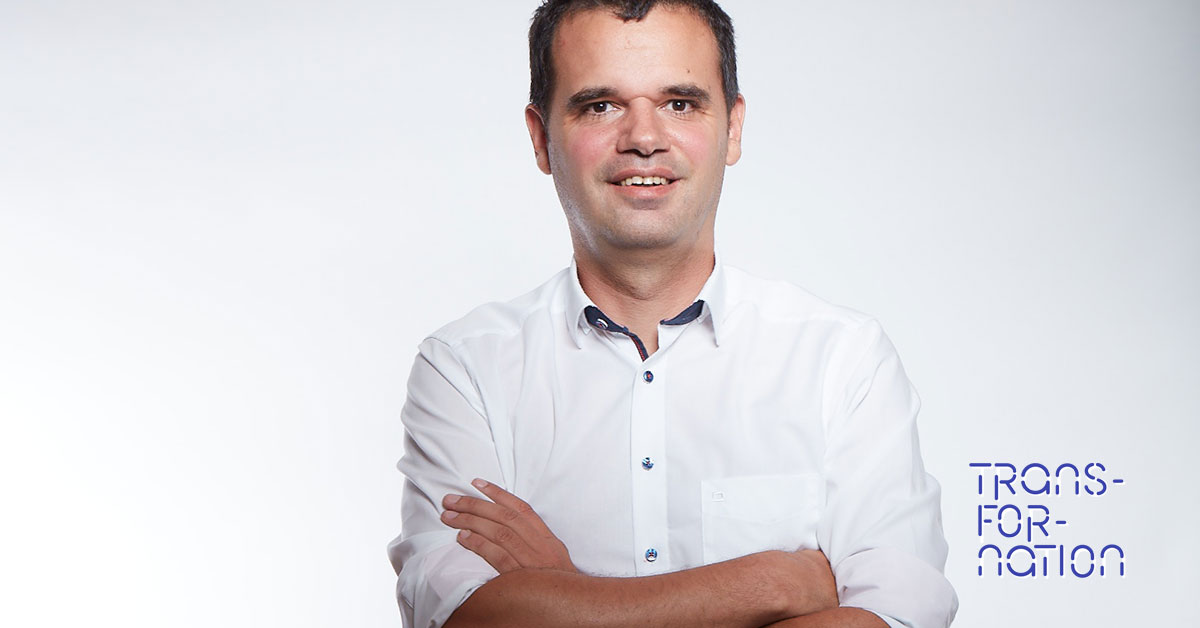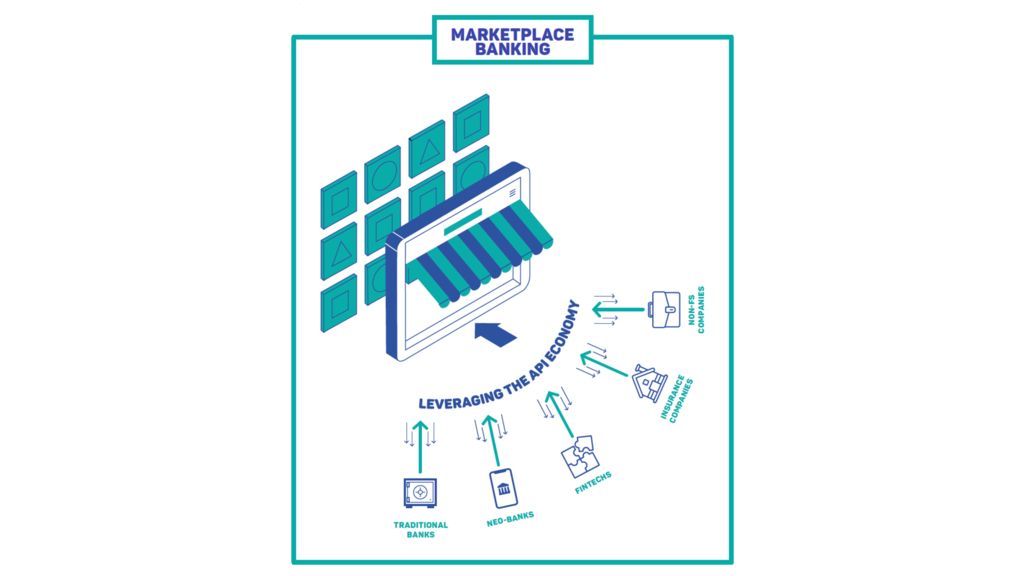DIGITAL BUSINESS
Marketplace Banking: a community hub for financial innovation
The financial services industry is evolving at a fast pace, driven by tech innovation, regulatory change and increased competition. Moreover, banks and financial institutions are constantly adapting to the new needs of their customers, who are now looking for real-time solutions, tailored products, enhanced user experience and much more on top of this. Over the last few years, many banks have leveraged the potential of APIs to surf the transformation wave. To do so, they have had to adopt the concepts of ecosystems and marketplaces, enabling rapid innovation and efficient product development.
January 17, 2022

We’ve discussed these key concepts with Jacques Pütz (CEO of LUXHUB) and Olga Gamayunov (Open Banking Product Manager, LUXHUB), who focus on the emergence of the API economy and the exchange of features and data via the Marketplace.
MARKETPLACE: A ONE-STOP-SHOP TO FOSTER INNOVATION
“Whether in the retail industry or the world of social media, many sectors have embraced ecosystem models, in C2C, B2C and also B2B, enabling an exchange between sellers and buyers, providers and consumers,” starts Jacques Pütz.
Such platforms are now extremely popular, especially within the B2C sector, with small, creative businesses able to reach new clients, who are attracted by the ability to access unique products in a secure and trusted environment. “It’s a win-win situation for both sellers and buyers, and actually a win-win-win situation if we include the platform in this too,” adds Mr Pütz.
Nowadays, just like in any other industry, traditional financial institutions simply cannot develop, offer and/or manage best-in-class services in-house, and can easily turn to Fintechs that specialize in specific domains and tasks to help them refine and improve their services.
Olga Gamayunov comments: “Fintechs are not trying to compete with banks anymore, but rather to become added-value suppliers, addressing specific and important pain points. Their services are seamlessly integrated within the overall value chain of the financial institutions, often with white-labelled solutions and of course APIs. By providing them – banks and Fintechs – with a platform to offer and consume innovative services, the LUXHUB Marketplace aims at becoming a key enabler and facilitator of digital transformation”.
In this context, the ecosystem/marketplace model is a great fit for the highly regulated financial services industry, with more players mutualizing their efforts, sharing their knowledge and leveraging the capabilities and specific expertise developed by third-party providers.
As explained by the experts, “we can even go one step further: in order to survive, banks and financial institutions simply need to embrace the concept of ecosystem banking and its business models, giving room for more innovation fuelled by collaboration”.
APIs fit perfectly within the concept of ecosystem/marketplace banking, with the very basis of their design based on optimizing their implementation within other systems. As a result, they simplify software development and smooth the path to innovation by enabling the exchange of data and/or functionalities, in a secure and flexible manner.
“This technological approach makes even more sense in the era of Open Banking, with financial institutions imposed to publish APIs and exchange data with their counterparts,” adds Olga Gamayunov.
WHY ENTER A FINANCE-ORIENTED MARKETPLACE?
“At LUXHUB, we’ve launched a Marketplace to bring legacy banking and cutting-edge Fintech innovation together, and therefore become a central hub for exchanging, discussing and ultimately developing the financial services of the future,” highlights Jacques Pütz.
Providers – financial institutions, regulated Fintechs and others – can offer their APIs from within a secure platform, benefiting from several environments – Sandbox, pre-production and production – depending on their needs.
“At LUXHUB , we’ve launched a Marketplace to bring legacy banking and cutting-edge Fintech innovation together, and therefore become a central hub for exchanging, discussing and ultimately developing the financial services of the future” / Jacques Pütz, CEO – LUXHUB
As explained by the Open Banking Product Manager, “beyond providing a complete commercial and technical platform to access, test and integrate Open Finance API products, our Marketplace also seeks to build a collaborative and innovative community of financial service providers.
“Yet, it is up to each financial institution to develop its own strategy regarding APIs in the Open Banking world: they can become suppliers or full-service providers”.
As a matter of fact, the LUXHUB Marketplace features API providers and consumers from the wider financial services industry, namely incumbents, Fintechs, insurers, security companies, and of course, data specialists.
For instance, in June 2021, LUXHUB partnered with Bâloise Assurances Luxembourg, through the integration of the insurer’s Mortgage Insurance API within the Marketplace’s secure environment. In concrete terms, Bâloise’s API enables client banks to embed real-time, tailored mortgage insurance quotes directly into their core banking system, in just a few clicks.
“That’s what marketplace banking, and the notion of ecosystems, is all about: mutualizing efforts; leveraging APIs to create new products, but also to reach new customers; exploring unexploited distribution channels, and of course, creating new revenue streams.“
“This is done while always bearing in mind the latest customer needs and demands, in a competitive environment where customer experience has become a key business enabler,” underlines Mrs Gamayunov.
GOING BEYOND FINTECH AND PROVIDING ADDITIONAL VALUE VIA API
In order to build a robust banking ecosystem and relevant marketplace, more APIs – outside the direct financial scope – have been added to the LUXHUB Marketplace.
As highlighted by the CEO, “our goal is to turn our platform into the go-to-place for financial institutions and Fintechs to uplift and boost their services. To do so, they can leverage the APIs made available in the Marketplace by innovative players, whether it be in the fields of data, security, or numerous others.”

Olga Gamayunov, Open Banking Product Manager – LUXHUB
For instance, the ICR – Intelligent Character Recognition – API is based on Accenture’s SaaS solution and provides the first building block for automated document processing, enabling significant time saving as it eliminates redundant tasks. It can be notably used by financial institutions, and especially insurance companies, to handle accident forms, for instance. Other use cases, such as fraud detection, enhanced onboarding and invoice payments could also be considered by the API consumers browsing the Marketplace.
“Fintechs are not trying to compete with banks anymore, but rather to become added-value suppliers, addressing specific and important pain points” Olga Gamayunov, Open Banking Product Manager – LUXHUB
Editus, the marketing agency/data specialist, published its Neo Data Provider API which provides consumers with easy access to a large and enriched database. This information can be used for AML and KYC issues, notably, but also for sales and marketing purposes. This API was recently updated with UBO (Ultimate Beneficial Owner, defined as “any natural person who ultimately owns or controls the customer or any natural person on whose behalf a transaction or activity is being conducted”) data. This enables entities, whether banks, insurance companies or any other business, to easily conduct the mandatory UBO check, and therefore access key information in real-time.
Finally, with security being an important component of the value chain of any company evolving in the finance sphere, COVR’s Global Authenticator API converts physical security into a portable digital identity that enables end-customers to authenticate themselves across all channels. Here again, several use cases are obvious, notably when it comes to eKYC, straightforward onboarding, and authenticating and authorizing payments.
“The addition of out-of-the-box solutions and APIs in the Marketplace is proof that LUXHUB keeps on building a wide ecosystem and also that it still aims at being a catalyst for the digital transformation of financial services. We, through our partners, are bridging the gap between customer needs, and the journeys they are currently experiencing with their bank/insurance company. Together, we are redefining the business models of the financial services industry, and building the finance of the future,” concludes Jacques Pütz.
